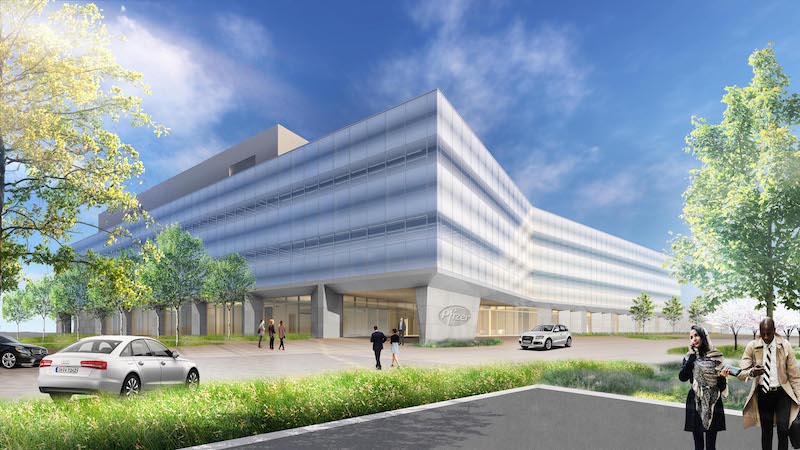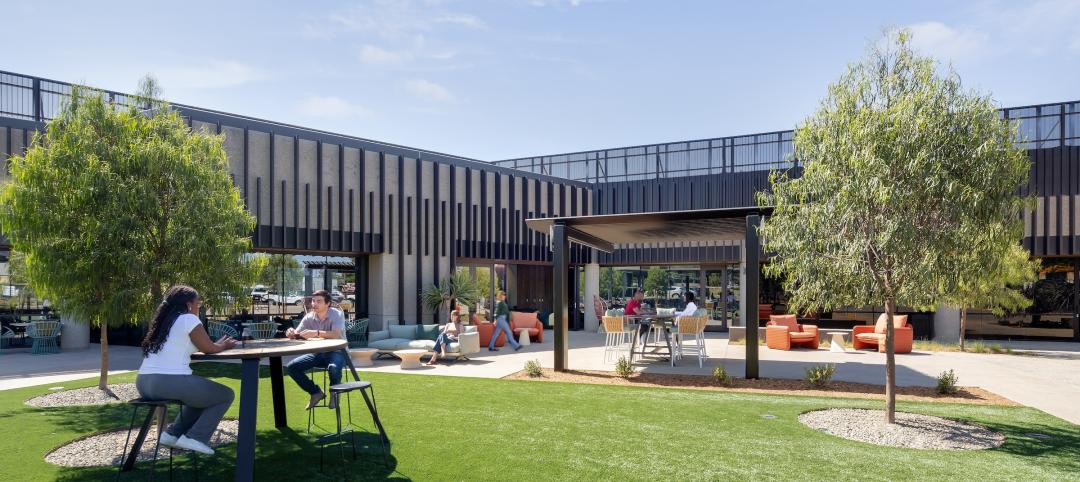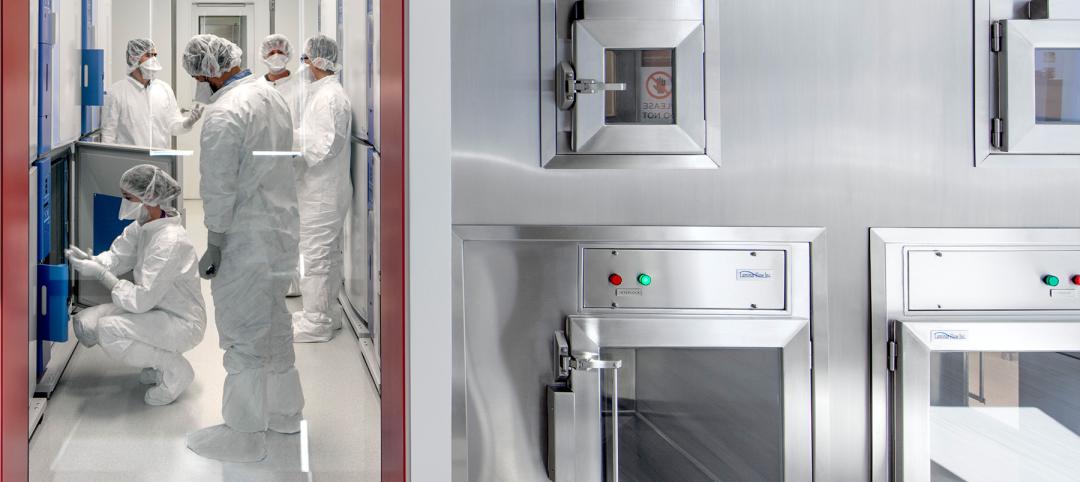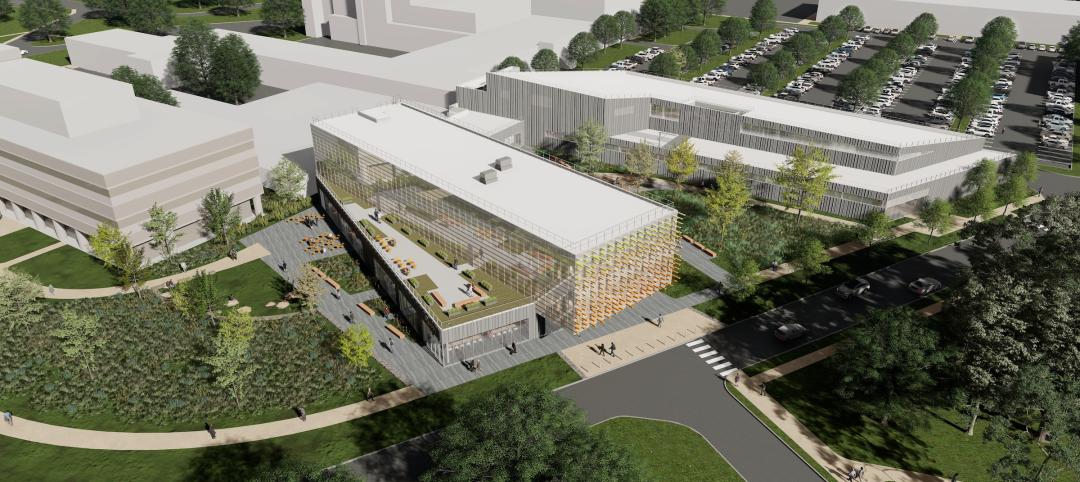In late June, Pfizer, the nation’s second-largest pharmaceutical supplier, broke ground on BioPlace, a $250 million, 285,000-sf R&D and process development facility in Chesterfield, Mo.
The new campus, when completed in mid 2019, will house the company’s BioTherapeutics Pharmaceutical Sciences Group, and consolidate more than 450 employees who currently work at multiple locations around St. Louis, including some who working out of leased space in Monsanto’s research center.
Pfizer intends to hire 80 more employees over the coming years to support research at this 32-acre site.
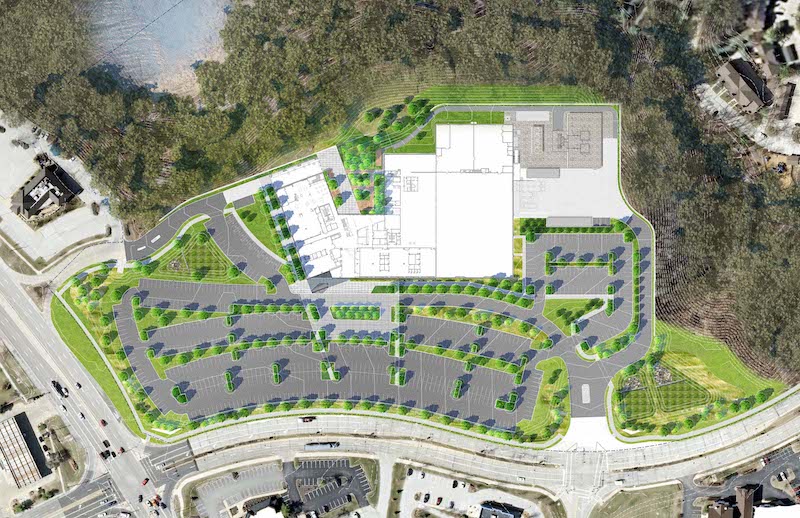
The 32-acre campus will allow Pfizer to consolidate more than 450 of its employees who are scattered at various leased sites around St. Lous. Image: Clayco
The focus of this facility, according to Pfizer’s website, will be on advancing the company’s portfolio in biologics, vaccines, and gene therapy by “developing manufacturing processes and dosage forms applying state-of-the-art analytical technologies.”
The campus will feature a floor plan with flexible laboratory layouts, scientific casework and utility hookups, open office and collaboration spaces, and increased conferencing technologies where researchers can collaborate.
A partnership of Forum Studio and Ewing Cole designed the architecture, landscaping, engineering, interior, and lab process areas for BioPlace’s research and office spaces. Clayco is the design-builder on this project in tandem with its development subsidiary CRG.
Once completed, Pfizer will lease the space from Clayco and CRG, which is providing turnkey build-to-suit services, according to the St. Louis Post-Dispatch.
Related Stories
Laboratories | Oct 23, 2024
From sterile to stimulating: The rise of community-centric life sciences campuses
To distinguish their life sciences campuses, developers are partnering with architectural and design firms to reimagine life sciences facilities as vibrant, welcoming destinations. By emphasizing four key elements—wellness, collaboration, biophilic design, and community integration—they are setting their properties apart.
Laboratories | Oct 2, 2024
Trends in scientific research environments: Q&A with Flad's Matt McCord
As part of an ongoing series, Matt McCord, AIA, NCARB, LEED AP BD+C, Associate Principal with Flad Architects, discusses the future of the scientific workplace.
Laboratories | Sep 27, 2024
Traditional lab design doesn't address neurodiverse needs, study finds
A study conducted by ARC, HOK, and the University of the West of Scotland, has revealed that half (48.1%) of all survey respondents who work in laboratory settings identify as neurodivergent.
Laboratories | Sep 26, 2024
BSL conversions: A cost-efficient method to support high-containment research
Some institutions are creating flexible lab spaces that can operate at a BSL-2 and modulate up to a BSL-3 when the need arises. Here are key aspects to consider when accommodating a rapid modulation between BSL-2 and BSL-3 space.
Higher Education | Sep 18, 2024
Modernizing dental schools: The intersection of design and education
Page's John Smith and Jennifer Amster share the how firm's approach to dental education facilities builds on the success of evidence-based design techniques pioneered in the healthcare built environment.
Great Solutions | Jul 23, 2024
41 Great Solutions for architects, engineers, and contractors
AI ChatBots, ambient computing, floating MRIs, low-carbon cement, sunshine on demand, next-generation top-down construction. These and 35 other innovations make up our 2024 Great Solutions Report, which highlights fresh ideas and innovations from leading architecture, engineering, and construction firms.
Laboratories | Jul 3, 2024
New science, old buildings: Renovating for efficiency, flexibility, and connection
What does the research space of the future look like? And can it be housed in older buildings—or does it require new construction?
Mass Timber | Jun 26, 2024
Oregon State University builds a first-of-its-kind mass timber research lab
In Corvallis, Oreg., the Jen-Hsun Huang and Lori Mills Huang Collaborative Innovation Complex at Oregon State University aims to achieve a distinction among the world’s experimental research labs: It will be the first all-mass-timber lab meeting rigorous vibration criteria (2000 micro-inches per second, or MIPS).
Healthcare Facilities | Jun 18, 2024
A healthcare simulation technology consultant can save time, money, and headaches
As the demand for skilled healthcare professionals continues to rise, healthcare simulation is playing an increasingly vital role in the skill development, compliance, and continuing education of the clinical workforce.
Laboratories | May 24, 2024
The Department of Energy breaks ground on the Princeton Plasma Innovation Center
In Princeton, N.J., the U.S. Department of Energy’s Princeton Plasma Physics Laboratory (PPPL) has broken ground on the Princeton Plasma Innovation Center (PPIC), a state-of-the-art office and laboratory building. Designed and constructed by SmithGroup, the $109.7 million facility will provide space for research supporting PPPL’s expanded mission into microelectronics, quantum sensors and devices, and sustainability sciences.


